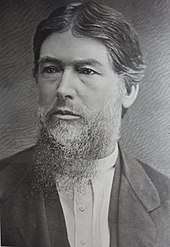John Goodwyn Barmby
John Goodwyn Barmby (Bapt. 12 November 1820–1881)[1] was an English Victorian utopian socialist thinker. He and his wife Catherine Barmby (died 1853/1854) were influential supporters of Robert Owen in the late 1830s and early 1840s before moving into the radical Unitarian stream of Christianity in the 1840s. Both had established reputations as staunch feminists and proposed the addition of women's suffrage to the demands of the Chartist movement.

Barmby was involved as an editor, writer, and organiser of communitarian ventures around London from 1838 to 1848. He is often associated with the growth of socialist and utopian projects during the rise of Chartism. He founded a utopian community on the Channel Islands and at times corresponded with radicals including William James Linton and Friedrich Engels.
Barmby is also known as the person who claimed to have introduced the word communist into the English language as a translation of the French word communiste during a visit to Paris in 1840 in conversation with some followers of Gracchus Babeuf.[2][3] He introduced Engels to the French communiste movement.[4] They founded the London Communist Propaganda Society in 1841 and in the same year the Universal Communitarian Association. Barmby founded the Communist Chronicle, a monthly newspaper later published by Thomas Frost. By 1843, the Barmbys had recast their movement as a church. The term "communism" was used slightly later, but certainly by the 1840s. As Donald F. Busky wrote, "Barmby may have thought that he invented the words communism and communist, but he was mistaken ... [I]n all probability [communist and communism were in use] by the 1830s or 1840s".[5]
Researchers at Rutgers University explain:
Seeking a richer spiritual life than Owenite socialism or Chartism offered, soon after their marriage Catherine and Goodwyn Barmby founded the Communist Church. Although the church expired in 1849, in the mid-1840s it had more than ten congregations.[6]
<<<broken link
Disillusioned with communism, Barmby became involved with Unitarianism in 1848. After leading congregations at Southampton, Topsham, Lympstone and Lancaster, he was minister of Wakefield Unitarian Chapel from 1858 to 1879. He continued to contribute to liberal politics and published poetry and hymns.[7]
References
- "Barmby, (John) Goodwyn (1820–1881), Chartist and socialist". Oxford Dictionary of National Biography. doi:10.1093/ref:odnb/9780198614128.001.0001/odnb-9780198614128-e-1445. Retrieved 2020-07-27.
- Harper, Douglas. "communist". Online Etymology Dictionary.
- "Sons of Liberty, Socioeconomics, Sovereignty, and Freedom".
- Engels, F., Letter to editor
- Donald F. Busky (2002). Communism in History and Theory. Greenwood Publishing Group. p. 82. ISBN 0-275-97748-X.
- "Intro".
- "Chartist Lives - John Goodwyn Barmby".
Further reading
- Barbara Taylor (1983). Eve and the New Jerusalem. pp. 172–182.